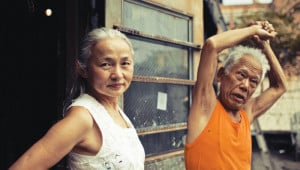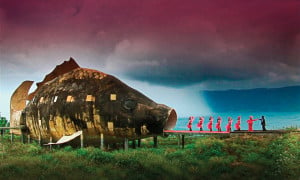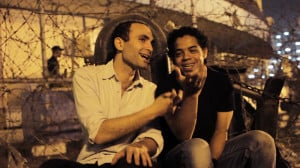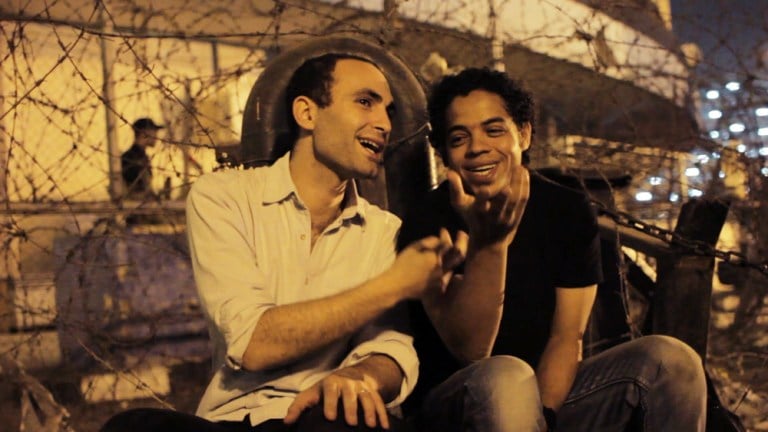Though they employ diverse stories and forms to convey their messages, this year’s Oscar-nominated documentary features all explore the role of art in contemporary society.
Both “20 Feet from Stardom” and “Cutie and the Boxer” expose the working realities of the contemporary art world, giving voice to relatively unheard artists. Meanwhile, “The Act of Killing,” “The Square” and “Dirty Wars” challenge audiences to consider the ethics and efficacy of art as a means of political expression. While these films are not of universal quality, they are, collectively, a reminder that art matters and that films have an uncanny capacity to shape the world they depict.
20 Feet from Stardom

In “20 Feet from Stardom,” director Melvin Neville shines a spotlight on the anonymous voices behind famous musicians like Ray Charles, The Rolling Stones, Stevie Wonder and Michael Jackson. The film puts back-up singers— including Táta Vega and Merry Clayton, Lisa Fischer and Judith Hill— at center stage, and the result is stunning, as their voices soar and their stories inspire. David Lasley, who performed with James Taylor, sums up the plight of background vocalists: “As a backup singer, they’d like you to come in, make things sound great, take very little credit and go home quickly!”
Neville’s film features the stories of several women who were unwilling to just “go home.” The film is never heavy-handed about its critique of gender and racial politics in the entertainment industry. Instead, Neville lets the music speak— or, rather, sing— for itself.
Cutie and the Boxer

Ushio and Noriko Shinohara met in New York in the 1970’s. He was a 41-year-old avant-garde painter, famous for his “action art.” She was a 19-year-old art student. Today, Ushio is 80, struggling to sell his work, while Noriko strives to find her own artistic voice. Zachary Heinzerling’s film, “Cutie and the Boxer,” is a portrait of their 40-year marriage.
The couple’s relationship is still a work in progress, influenced by ongoing financial pressures and their competing creative ambitions. As Noriko works on a graphic novel based on her relationship with Ushio, romance and family life become the materiality of her work. Despite Noriko’s creative pursuits, nothing about her relationship with Ushio conforms to cartoon. “Cutie and the Boxer” is a subtle, deft film about one couple’s love language— the fights, silences, paintings and dances at the heart of their life together.
The Act of Killing

Anwar Congo and Herman Koto are self-professed “gangsters,” former Indonesian paramilitaries who helped perpetrate the slaughter of at least half a million people during Indonesia’s 1965-66 massacres. In “The Act of Killing,” director Joshua Oppenheimer encourages Congo, Koto and their compatriots to re-enact their four-decade-old killings, using costumes, make up and special effects to depict their role in the atrocities.
“The Act of Killing” is a horror film. It is also a formally innovative and excruciatingly provocative documentary about the relationship between performance, mass violence and memory. It is hard to watch the perverse performances: Congo pretends to suffocate a man with wire and Koto dresses up as a female victim. Their pageants resemble surrealist musicals, Westerns and film noir dramas, raising questions about the links between “play” violence and actual atrocity.
That said, because the film provides very little information on the terms of Oppenheimer’s relationship with the “actors,” the extent to which Congo and Koto were manipulated or, in fact, “directed” is unclear. The film is also weak where it fails to adequately contextualize the barbarism of Congo and Koto: What were the economic and political incentives that drove their behavior? How, exactly, did the Indonesian army engage in its campaign of extermination?
More broadly, I found myself wondering whether Oppenheimer was right to provide these men with a platform to re-live their memories (or fantasies) without providing a clear historiography of the conflict. Ultimately, though, these questions are the heart of the film’s value: “The Act of Killing” forces us to think about our own position as an international “audience,” observing past and present atrocities worldwide.
The Square

Directed by Jehane Noujaim, ”The Square” tells the story of the Egyptian Revolution through the eyes of its activists. Noujaim’s brave documentary allows viewers to bare witness to history: we eavesdrop on conversations in protest tents and observe demonstrators’ violent encounters with the armed forces. The film’s protagonists have diverse backgrounds and motivations, but they share undying perseverance, choosing time and again to risk their lives for freedom and democracy.
This film is also a subtle evaluation of the revolution’s outcomes. It exposes activists’ slippage between idealism and naivety, as well as the pitfalls of a “leaderless” political movement. The camera team is unafraid to ask difficult questions and shoot from the eye of the storm. In this sense, Noujaim, her colleagues and her characters are all revolutionaries, capturing and elaborating the ideals that exploded in Tahrir Square three years ago.
Dirty Wars
“Dirty Wars” follows investigative journalist Jeremy Scahill to the frontlines of the War on Terror. Directed by Richard Rowley, the film begins in 2010 in Gardez, Afghanistan, after a raid by U.S. forces results in the death of several civilians. Scahill’s subsequent investigation of the Joint Special Operations Command takes him to Pakistan, Yemen and Somalia where, according to Scahill, “somehow, before our eyes, undeclared wars have been launched across the world.”
This film was the most disappointing of this year’s Oscar nominees. The documentary depended largely on Scahill’s narration, which seemed, at times, melodramatic and self-congratulatory. Some of the scenes— for instance, one in which Scahill pins evidence to a bulletin board above his desk— felt corny and staged. More importantly, the substance of Scahill’s argument was not rigorously tested and cases of civilian casualties were not remotely contextualized. It’s hard to trust the documentary to stay objective when it seems as if the audience has been denied the complete picture.
This film’s shortcomings are additionally disappointing because its topic is so worthy. The “twisted logic” of America’s War on Terror— a “war without end”— merits attention and critique. Journalists and filmmakers with the tenacity to travel to “denied areas” and to uncover untold stories have more of a role to play than ever— but only if they can report their findings without serving a predetermined political agenda.
In some ways, “The Square” succeeds where “Dirty Wars” failed— trying to leverage documentary shooting to humanize and complicate our understanding of a political conflict. Other films, such as Sarah Polley’s “Stories We Tell” and Gabriela Cowperthwaite’s “Blackfish,” may have deserved the nomination “Dirty Wars” received. The Oscar nominations should not be read as a definitive top-five list of this year’s documentaries. Instead, they are more valuable as a testament to film’s diverse applications and exciting potentials.
Contact Gillie Collins at gcollins “at” stanford.edu.
